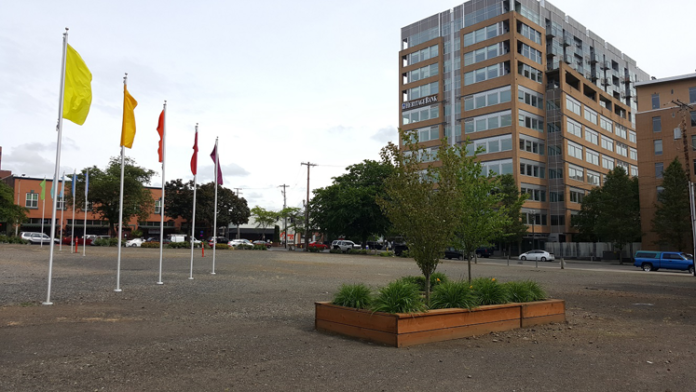When grocery stores like Fred Meyer, New Seasons and Trader Joe’s scope out potential new sites, they take into consideration factors such as lot size (not only for the development of a store, but also the required parking), population density and demographic information such as average wages in the area.
For decades, downtown Vancouver did not fit the bill – the population was too small and parts of downtown were alternatively seedy or sleepy. However, as the area experiences a renaissance, with new residential, office and retail development, calls for a downtown Vancouver grocery store are getting louder.
Growth is excepted to continue. According to a study conducted on behalf of the city by Leland Consulting, development along the waterfront and at Fort Vancouver will bring approximately 4,500 new residents and office workers to the area. Roughly 8,000 people already work downtown, and that number is expected to grow by at least two percent by 2017.
“Our downtown continues to grow,” commented Vancouver City Councilmember Jack Burkman. “We have a lot of breweries. We have a lot more restaurants. We have a lot more people, which is a great change from the past. A grocery store is part of providing the full service of the people who want to live there.”
“There is a lot of pent up demand,” added Lee Rafferty, executive director of Vancouver’s Downtown Association. “Downtown would benefit greatly by having a downtown grocery store. Many see it as the missing element.”
Block 10 – the last vacant block in downtown, located on 8th and Washington streets – may be the best spot to build a grocery store. In May, the city began accepting proposals from developers and is currently evaluating them.
Burkman said the city council will make a decision, likely during executive session, on the Block 10 proposals within the next month.
“We’re interested in especially those that would incorporate a grocery store,” Burkman noted. “My dream for Block 10 is a multi-story building with a grocer on the bottom floor, then retail about that, then office and residential above that.”
The Leland Consulting report found that area residents and employees could spend close to $25 million a year if a grocery store were located downtown.
“It’s an acceptable business risk to put [a grocery store] in because… we’re getting more and more people,” Burkman said.
Rafferty believes some grocers – bigger ones like Fred Meyer or Safeway – might not be a good fit for downtown because those grocers require larger footprints. Jim West, a real estate broker with Coldwell Banker Commercial-Jenkins & Associates, agreed.
“It wouldn’t be one of the big corporate chains because it wouldn’t fit their model,” said West. “The parcels that could possibly be put together to do it are getting bought up.”
But that doesn’t mean creative solutions can’t be reached to bring a grocery downtown. For example, Rafferty said Green Zebra, a Portland-based specialty grocer, “has figured out the code and knows how to be successful in downtown.” Officials at Green Zebra did not respond to requests for comment.
Rafferty also said that other buildings could be redeveloped to accommodate a grocery store, such as the building on 8th and Main that formerly housed the Spanky’s Consignment store.
“Stories could be added because [those buildings] were designed with that kind of flexibility,” she said. “The Spanky’s building is totally built with the capability to go up a few more stories.
“Neighbors are primed to be supportive and loyal,” Rafferty added. “If we just get the right developer and the right project together, it shouldn’t be that far down the road.”
In April, downtown residents submitted 550 petitions to the city expressing the desire for a store to open in downtown, adding that petitioners said they would “regularly shop” at a downtown grocery store.
“Something that I hear from the grocers is that it will occur when we have enough people. A number of us believe that we have the number of people,” Burkman said.
Ann Marie Ricard, a spokesperson for Whole Foods, said there are no current plans to build a store downtown.
Jerry Chevassus, chief development officer for New Seasons Market, which is headquartered in Portland, said new stores are a possibility in the future, but that New Seasons is currently focused on the November opening of its newest location in Mercer Island, WA.
“We believe in growing thoughtfully and sustainably and we will continue to look at possible future neighborhood sites, including in the Portland-Vancouver metro area, that align with our brand values of strong community,” said Chevassus. “Historically, we have added one-to-two stores per market per year, and believe this is a good rate of growth for us.”





